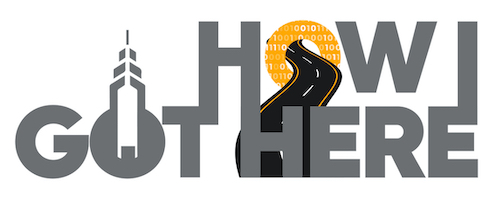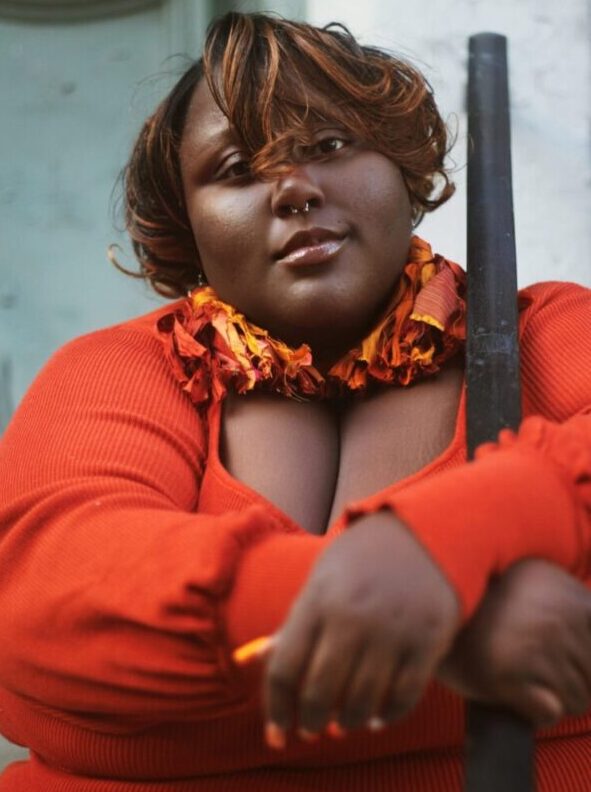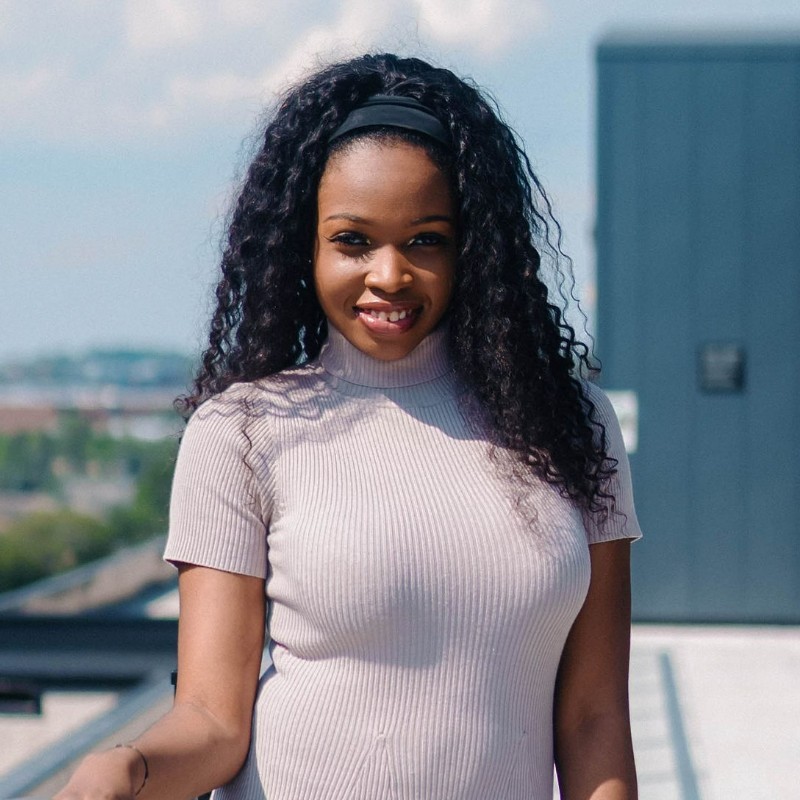Experiences like her first job at a theater exposed Ajani, who is originally from Prince George’s County near DC, to pay gap issues early on. In that job, her wages ranged anywhere from $11 to $12, while those of coworkers who did not look like her were much higher. The SaaS platform founder and 2022 Washington Business Journal Inno Under 25 awardee was unintentionally gathering her case studies early.
“People in leadership within the theater I worked in were usually men,” she told Technical.ly. “There may have been one white woman in a leadership role, but there were usually white men in charge.”
In 2020, Ajani landed what she says was her dream job: a role as a financial analyst at Morgan Stanley. Still, even after earning multiple degrees and fulfilling this aspiration, she was paid “anywhere from 35% to 40% less than her male counterparts”. While this young founder was grateful for her dream job, she did go back to human resources to raise the issue of the pay gap and was met with resistance — and a reminder of the fact that she signed a non-negotiable agreement. Ajani said that this stipulation made her stick to her initial compensation offer.
“I was extremely devastated and upset,” she recounted.
Adeola knows, and statistics assert, that the reasons for this gap go beyond any non-negotiable agreement. Moreover, improvements to these gender-based pay disparities have slowed during the pandemic; that’s especially true for non-white women. But those emotions after being refused a raise fueled her goal of providing other women of color the tools, support and confidence they need to make empowered decisions for their career success and financial security — all toward the goal of an equitable society.
Fem Equity was thus founded by Ajani and COO Chidera Egbuche in February 2021. Its SaaS platform provides financial education and professional development to help women and underrepresented professionals thrive in tangible ways. This innovation landed Fem Equity and Ajani spots in Johns Hopkins’ Social Innovation Lab (SIL), TEDCO’s Open Institute for Black Women Entrepreneur Excellence and the honorable mention section of Technical.ly’s 2023 RealLIST Startups.
Still, despite these accolades, Ajani frequently encounters biases rooted in longstanding racist and sexist dynamics that plague both Baltimore and the tech industry at large. She spoke to Technical.ly about these barriers she and other Black female tech founders face, her path to becoming a founder, the double-edged sword of funding appeals, her local role model and more in the Q&A below.
This conversation has been edited for length and clarity.
###
How did you get into social entrepreneurship? How did you find your customer segment for Fem Equity?
After talking to over 100 professionals in the Towson and Baltimore area and hearing similar stories to my own surrounding pay equity, I began what I now know as customer discovery. I started a pilot program with 10 women where we had community discussions about job issues and employment barriers. Within six months, everyone from that pilot was not only employed but also had an average salary increase of $15,000. During this time, we conducted a Google survey and found that over $25,000 of student loan and consumer debt was canceled due to COVID debt relief. Participants attributed this to the community and resource sharing we were doing.
It was then that I realized the potential impact of my work and applied to the Hopkins Social Innovation Lab accelerator. Since then, we have been able to scale and expand our efforts.
What are some of the barriers you face as a Black woman founder?
I’ve received awards and accolades, and I have all these top credentials at only 24, which is great. However, I feel like I can’t always be my authentic self in professional settings. There’s pressure to be a clean-cut, well-put-together professional woman, and it’s difficult because I’m human and I have off days. I know that people are looking for reasons to say no, even if it’s something small.
I’ve spoken to other Black and brown women professionals, and it’s a struggle we all face. We have to calculate every day how we present ourselves to ensure that we get the opportunities we deserve. This pressure also affects funding issues.
Tell us more about why founders like you might face difficulties securing funding.
While I have the necessary qualifications to secure appropriate funding for my venture, funding has been a major constraint for us. As a first-generation or international team in Baltimore, my cofounder, who is an international student, and I face various challenges. Women receive only 2% of venture capital, and Black women even less than 1.1%. Even with the capital we do receive, it feels like we are overqualified and have to meet excessive metrics and traction, while our counterparts may not have to. Although some may argue that we are a young organization, we have been in operation for over two and a half years, and we are more than qualified for the funding we seek.
Are Black female tech founders held to a higher standard?
Yes! Even when we do manage to secure funding, it often feels like we’re being held to a higher standard than our counterparts. While they may not need to have all the metrics and a perfect pitch deck, we’re expected to have everything in place before we can even be considered. It’s frustrating because we’ve been at this for over two and a half years now. We’re not a young organization anymore and we’re more than qualified to receive the funding, resources, human capital and social capital we need to scale. I’ve been fortunate to have access to many programs, accelerators and mentors, but the reality is that I’m over-programmed and underfunded. That’s just the truth.
In 2023, I want to change that narrative. I want to be overfunded and well-programmed because we have the potential to truly scale and make an impact. But we can’t do it alone. We need the support of a community, resources and mentors who believe in our vision and are willing to invest in us. We’ve seen some support already, and we’re grateful for it, but we want to amplify it even further.
Are you currently fundraising? If so, in what round are you?
We are in pre-seed and I’m aiming to close this round in the next 60 days. However, I must admit that fundraising can be exhausting and challenging.
The biggest barrier we face is the lack of available capital in Baltimore. It seems like we may have to look outside of the city to secure the funding we need, which is disappointing considering the amount of local capital available. It appears that those who truly want to support and invest in us may not be based in our immediate area, and we may need to broaden our reach to find the right investors.
How many employees are on Fem Equity’s staff?
I work full-time and receive some equity. My cofounder is currently part-time but will transition to full-time after she graduates from Towson with her master’s degree. We also have an advisory board [whose members] have stood the test of time. In addition, we work with four part-time contractors whom we fund periodically. We were able to fund them correctly through the Hopkins program, where we received $6,000 in non-diluted funding from the accelerator. Last year, we also had a successful crowdfunding campaign called “Know Your Worth,” where we raised over $9,000. Moreover, we have a recurring revenue stream from a membership-based program and are revenue-positive at the moment.
I’ve been fortunate to have access to many programs, accelerators and mentors, but the reality is that I’m over-programmed and underfunded. That’s just the truth. Adeola Ajani Fem Equity
We would love to hear more about your partners. How did you find them?
The goal with all partnerships is that we’re able to resource-share and, eventually, their young professionals can come to Fem Equity so that they don’t have to experience inequity in any wage, shape or form. We’re looking to scale and establish even more partnerships.
We have a partnership mixer planned for March 17, which I’m really excited about. Our partners and founders are the reason I stay motivated. Even when I feel like giving up, they remind me of our mission and keep me going. For example, Kieta [Iriate-Amin, an advisory board member] is amazing and has connected us with Jubilee Arts. One of our Hopkins SIL alums helped us make valuable connections to Pivot and our collaboration with them has been amazing. Our goal with all partnerships is to share resources and eventually offer equity to young professionals so that they don’t have to experience any wage inequity. So far, our partnerships have been great, and I can’t wait to grow with them and align with more partners who share our mission of achieving pay equity.
Women’s History Month just started. With that in mind, who is a woman, past or present, that inspires you in your work the most?
Ellington West [of Sonavi Labs] is one of our mentors and definitely my woman of the month. She’s one of the few women who has raised over a million in VC capital, and her work outside of her organization aligns with breaking equity gaps and creating a level playing field for Black and brown women. I admire her as a trailblazer and have learned a lot from her. She’s just awesome, and seeing all the things she’s doing is inspiring.

This is How I Got Here, a series where we chart the career journeys of technologists. Want to tell your story? Get in touch.
Before you go...
Please consider supporting Technical.ly to keep our independent journalism strong. Unlike most business-focused media outlets, we don’t have a paywall. Instead, we count on your personal and organizational support.
3 ways to support our work:- Contribute to the Journalism Fund. Charitable giving ensures our information remains free and accessible for residents to discover workforce programs and entrepreneurship pathways. This includes philanthropic grants and individual tax-deductible donations from readers like you.
- Use our Preferred Partners. Our directory of vetted providers offers high-quality recommendations for services our readers need, and each referral supports our journalism.
- Use our services. If you need entrepreneurs and tech leaders to buy your services, are seeking technologists to hire or want more professionals to know about your ecosystem, Technical.ly has the biggest and most engaged audience in the mid-Atlantic. We help companies tell their stories and answer big questions to meet and serve our community.
Join our growing Slack community
Join 5,000 tech professionals and entrepreneurs in our community Slack today!

The person charged in the UnitedHealthcare CEO shooting had a ton of tech connections

From rejection to innovation: How I built a tool to beat AI hiring algorithms at their own game

Where are the country’s most vibrant tech and startup communities?



